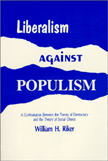“. . . a work of consequence . . . it will endure because it is almost certain to generate a significant debate about issues that go to the heart of both nomenclature and positive theorizing about politics.” —American Political Science Review
“. . . a persuasive theory of political change that one rarely encounters in the study of politics.” —Journal of Economic Literature

311 pages, $44.95 list
0-88133-367-0
978-0-88133-367-1
© 1982
paperback
eBook availability
Liberalism against Populism
A Confrontation between the Theory of Democracy and the Theory of Social Choice
The discoveries of social choice theory have undermined the simple and unrealistic nineteenth-century notions of democracy, especially the expectation that electoral institutions smoothly translate popular will directly into public policy. One response to these discoveries is to reject democracy out of hand. Another, which is the program of this book, is to save democracy by formulating more realistic expectations. Hence, this book first summarizes social choice theory in order to explain the full force of its critique. Then it explains, in terms of social choice theory, how politics and public issues change and develop. Finally, it reconciles democratic ideals with this new understanding of politics.
Reactions
1. The Connection Between the Theory of Social Choice and the Theory of Democracy
2. Different Choices from Identical Values
3. Simple Majority Decision
4. Voting Methods with Three or More Alternatives
5. The Meaning of Social Choices
6. The Manipulation of Social Choices: Strategic Voting
7. The Manipulation of Social Choices: Control of the Agenda
8. The Natural Selection of Political Issues: An Interpretation of Political Disequilibrium
9. Manipulation and the Natural Selection of Issues: The Development of the Issue of Slavery as a Prelude to the American Civil War
10. Liberalism, Populism, and the Theory of Social Choice
2. Different Choices from Identical Values
3. Simple Majority Decision
4. Voting Methods with Three or More Alternatives
5. The Meaning of Social Choices
6. The Manipulation of Social Choices: Strategic Voting
7. The Manipulation of Social Choices: Control of the Agenda
8. The Natural Selection of Political Issues: An Interpretation of Political Disequilibrium
9. Manipulation and the Natural Selection of Issues: The Development of the Issue of Slavery as a Prelude to the American Civil War
10. Liberalism, Populism, and the Theory of Social Choice
